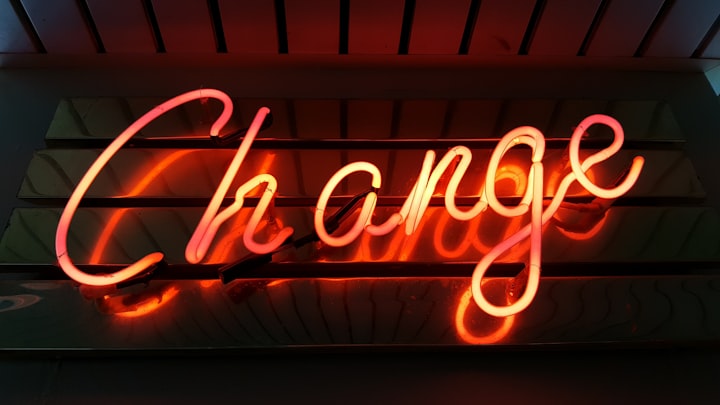The Only Thing Constant In Life Is Change. Really?
We do live in an era of change. That is for sure.

Humanity has come a long way and seen many changes over the years.
As Daliso Chaponda, a comedian on Britain's Got Talent once said,
We've got Wifi. We've got rights. Women can vote. I'm black. 200 years ago, this would have been an auction!
Full clip of his performance as below:
We are living in an era of change.
Things that were formerly unacceptable have now become more accepted by society. Those who don't accept the change are usually deemed as traditionalists and old-fashioned.
But do ALL things need to be changed?
We'd quickly find that the answer to that is a resounding NO.
Why so?
We do hold on to certain ethics and moral values that, if changed, may give rise to a moral outrage within us. Some of these moral values are built upon the foundation of religious teachings. For example, we do have a strong sense of indignation when we see what is happening in the world around us today, thanks to the power of the Internet, the news and social media:
1. We do not condone murder, for instance. Names like Jeffrey Dahmer will forever be enshrouded in notoriety for what they have done.
2. Neither do we like the idea of paedophilia, and there will be an uproar of "shoulds" and "should nots" when a person who is sexually attracted to underaged children asks others to be understanding of their "sexual orientation."
3. People get up in arms over the abortion debate. Should abortion be legal? Should it be funded by the government? Pro-life groups believe that life is sacred and that unborn babies have the right to life. Pro-choice groups believe that the mother has the right to decide whether she wants to carry the baby to full term. They will forever be at loggerheads with each other, and never the twain shall meet.
Our values, therefore, are things that we don't really want to change at all.
Even in the face of strong, opposing, credible evidence.
We hold on to them most tightly. On our deathbeds, even. It's difficult to change our minds on that.
What can be changed, then?
What we can change are our modes of operation.
Steve Sasson, a Kodak engineer, was credited with inventing the first ever digital camera. As it is said,
In 1995 the company brought its first digital camera to market, the DC40. This was years before many others would get into the digital game, but Kodak never took advantage of its early start. Philosophically, the company was steeped in the film business, and to embrace digital meant cannibalizing its own business. Others quickly filled the niche, and Kodak didn't fully rev up its digital business until 2001, when it launched the EasyShare line of point-and-shoot cameras.
Retrospectively, we can look back at the failures of Kodak's business strategy to adapt and develop their intellectual property into a new line of revenue, and they paid the price for it by filing for bankruptcy in 2012.
A poor business strategy turned them irrelevant and unwanted. And when businesses are irrelevant, unwanted, and fail to reinvent themselves, they face a loss of their customers to other competitors and lose out on a stream of revenue. Without revenue, and with mounting costs... the imbalance of their financial health statements will eventually drive them bankrupt.
We can see for ourselves in this COVID-19 pandemic situation that a lot of businesses are suffering, but yet a select few are thriving.
Having an online platform and providing delivery services, for instance...
Amazon played the game really well during the pandemic.
It was said in this article that:
While rival brick-and-mortar retailers have had to shut stores during government-imposed lockdowns, Amazon hired 175,000 people in recent months and saw demand for its services soar.
The company said revenue jumped 40 per cent from a year earlier to US$88.9 billion.
In the midst of government-imposed lockdowns and a slowdown in business for most brick-and-mortar shops, Amazon actually had to hire 175,000 people to fulfil the shopping order volumes that consumers were placing - especially when they need to get essential items or simply because they got bored of staying at home and doing nothing - essentially online retail therapy.
Therefore, having an online platform for doing business is key, and the platform must stock items that people want to buy.
Traditional businesses that are unable to adapt will end up losing their revenue sources to other businesses that are more quick to adapt.
And that will have a trickle down effect on the employees. An employee working in a sinking business will eventually find themselves out of a job in due time, as evidenced by the massive downsizing and layoffs across many corporations worldwide.
For example, when there is no demand for air travel at the moment, how can the major airlines in the world justify the size of their staff populations?
Whereas other sectors face evergreen demand, such as the medical sector. Even as Singapore's economy heads for a recession, the observation about the medical sector is that "the pandemic has in fact boosted demand for medical products, making it Singapore's only trade-related industry to register growth amid the collapse in global demand for other exports."
Personally, how do we change?
We have had to adapt with a whole slew of protective measures.
Masks are now mandatory in most countries and societies when entering crowded areas because of how contagious the coronavirus can be.
As I also did highlight in The Death Of Critical Thinking In This COVID-19 Coronavirus Pandemic,
And yet, in Melbourne, Australia, where a second lockdown has been imposed because of an increasing spike in infections, and where it has also become a law that one must have a mask on when outdoors, people still refuse to comply, as it can be seen in this video below:
In the face of all this information that masks can help to reduce the potential of the virus spreading, some people are still adamant that this COVID-19 pandemic is not that serious of a problem.
They have the "right" to not wear a mask!
They have the "right" to attend COVID parties!
And of course, they have the "right" to get infected by the COVID-19 coronavirus at the COVID party and die as a result of it, aged just 30.
While the information is out there, there is a ton of misinformation out there too. The 30 year old who died of the COVID infection "thought the disease was a hoax. He thought he was young and invincible and wouldn't get affected by the disease".
People who refuse to heed the warnings of change can also be rendered irrelevant and obsolete, much like how a failing business becomes irrelevant and obsolete.
However, Kodak's "death" was but a mere formal acknowledgement that they were bankrupt.
A person's death... They no longer are able to live on Planet Earth and enjoy what Planet Earth has to offer them. Their friends and family will grieve, and they will be no more.
These personal relationships amplify the loss felt when a loved one dies.
How much can we change, then?
That all depends on what we value.
If we are hard-nosed and choose to value freedom over scientific reasoning, for instance?
If we choose to be stubborn and cling on to the mast of a sinking ship, for instance?
It's all based on our choices. What does matter the most to us? What do we value the most?
And when we're looking at income sources, how do we ensure a constant stream of income if our jobs are made redundant?
I do examine that in this ebook - Can We Improve Our Health And Our Wealth In Tandem, or really, is taking care of our health profitable? I blend aspects of the profitable wellness sector (to look at enhancing our physical health) together with aspects of the sharing economy (to look at enhancing our financial health) that is popular for creating a sideline income/side hustle that people are looking out for these days.
Do feel free to have a look at it to see how I'm doing it myself!
Joel Yong, PhD, is a biochemical engineer/scientist, an educator and a writer. He has authored 1 ebook (which is available on Amazon.com in Kindle format) and co-authored 6 journal articles in internationally peer-reviewed scientific journals. His main focus is on finding out the fundamentals of biochemical mechanisms in the body that the doctors don’t educate the lay people about, and will then proceed to deconstruct them for your understanding — as an educator should. Do visit his website here to connect.
About the Creator
Dr Joel Yong
Engineering biochemical support strategies for optimal health. Subscribe to my mailing list to not miss out on the latest content!






Comments
There are no comments for this story
Be the first to respond and start the conversation.